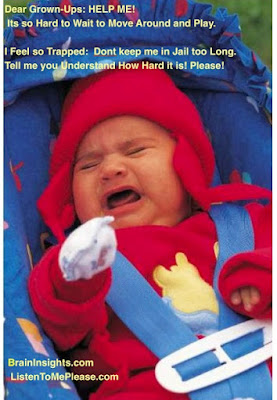Last week while watching a special on television I became even further inspired. It was a program reflecting on the achievements, and of course the dreams of Dr. Martin Luther King Jr. As the program ended, I stated, "I want to create a nationwide (actually worldwide) movement for children!"
Of course as you know my goal is to have EVERY adult understand the extraordinary opportunity we have to develop children's brains in healthy ways!
So as I went to bed that night, I planned to write an, "I Have a Vision" blog. The next morning, when checking my email I see a blog post entitled, "Dare to Have a Dream for Our Children." by Cindy Terebush. Because, I immensely enjoy thoughts Cindy shares, I was excited to read this post. It was the same concept I had planned to write!
With enthusiasm I let her know that I could not wait to share what she had written! She gave me permission to share it. So here is an excerpt and a link for you to enjoy and share!
Dare to Have a Dream for Our Children
Fifty years ago today, Dr. Martin Luther King, Jr. stood on
the steps of the Lincoln Memorial and shared his dream of freedom and
equality. It was a moving and bold
speech that provided a defining moment as African American people fought for
their civil rights. Today, Barack Obama –
the first African American President of the United States - stood on those same steps to pay tribute to Dr.
King. We may still have a way to go but
thanks to visionaries like Dr. King, we have progressed.
Be a visionary with me and dream for our children. They are growing up in a world that makes me
concerned for the adults they will be.
- I have a dream that children will play in front yards again and watch ants crawl in the grass.
- I have a dream that those children will be safe enough to ride bikes through their neighborhood and come home when the street lights come on.
- I have a dream that children will play on swings and try to get over the metal bar while staring at the clouds.
- I have a dream that someone will realize that standardized testing proves nothing except that humans have the capacity to memorize and so they will be abolished.
- I have a dream that the lockdown and evacuation drills become unnecessary and our children feel safe in their schools.
- I have a dream that young people will be able to just be who they are and not fear telling people that they are gay or lesbian or bisexual or transgendered.
- I have a dream that technology will do what we thought it would – save us time and not use so much of it that we have no time to watch the birds fly, the leaves blow and the waves hit the shore.
- I have a dream that community becomes a priority once again so that people walk away from their computers and value time talking in the same room.
- I have a dream that we teach our children that doing good in this world is more important than winning the dance competition or sporting event.
Dare to dream …
Click here to go to Cindy's blog to benefit from all she has to share! Enjoy!
My vision is that we ensure that every child ...
- begins life with a very loving, and
- consistently responsive caregiver.
- benefits from a safe, predictable and chaos free environment.
- is always respected as a unique and special individual.
- is provided with the healthy nutrition, sleep and opportunities for physical activity that their body and brain needs.
- has the opportunity for self directed play throughout each day.
- experiences nature every day.
- is valued every moment.

It would be wonderful to hear what visions you would add!























